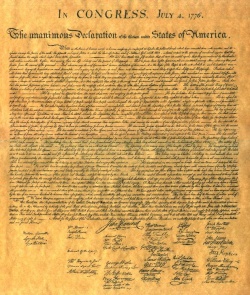Difference between revisions of "Portal:American Independence"
m |
|||
| Line 5: | Line 5: | ||
<tr> | <tr> | ||
<td style="padding:5px;"> | <td style="padding:5px;"> | ||
| − | When the first | + | When the first colonists arrived in North America, an independent America was likely inevitable, but it was 160 years in the making. Independence from English rule was far from the minds of most colonists until it was almost on them. |
| − | The period between the Treaty of Paris in 1763, that ended the conflict between England and France, and the signing of the treaty that granted American independence in | + | The period between the Treaty of Paris in 1763 ([https://en.wikipedia.org/wiki/Seven_Years%27_War The Seven Years' War] as it was known in Europe; the French and Indian War as it was known in America), that ended the conflict between England and France, and the signing of the treaty that granted American independence in 1763 was a time of increasing discontent between colonial America and England. In 1763, with hostilities with France at an end, King and Parliament turned attention to the colonies. It was not welcome attention in America. It took the form of increased taxation and restrictive trade rules (an increased intrusion on economic independence and the colonists ability to prosper) that England ultimately decided to enforce by show of force. The pride that colonists took in their association with England was at an all time high in 1763. Thirteen years later, in 1776, representatives of each of the colonies signed the Declaration of Independence, giving notice that they would separate from England. Seven years later, independence was secured. |
==Articles for this category== | ==Articles for this category== | ||
| − | This category is the place to assign sub-categories and articles about events and ideas | + | This topic category is the place to assign sub-categories and articles about events and ideas that lead to American Independence with emphasis on the period between 1763 and the signing of the Declaration of Independence. |
</td> | </td> | ||
<td>[[File:declaration of independence.jpg|250px|link=]]<br> | <td>[[File:declaration of independence.jpg|250px|link=]]<br> | ||
Latest revision as of 12:48, 2 April 2016
American Independence
|
When the first colonists arrived in North America, an independent America was likely inevitable, but it was 160 years in the making. Independence from English rule was far from the minds of most colonists until it was almost on them. The period between the Treaty of Paris in 1763 (The Seven Years' War as it was known in Europe; the French and Indian War as it was known in America), that ended the conflict between England and France, and the signing of the treaty that granted American independence in 1763 was a time of increasing discontent between colonial America and England. In 1763, with hostilities with France at an end, King and Parliament turned attention to the colonies. It was not welcome attention in America. It took the form of increased taxation and restrictive trade rules (an increased intrusion on economic independence and the colonists ability to prosper) that England ultimately decided to enforce by show of force. The pride that colonists took in their association with England was at an all time high in 1763. Thirteen years later, in 1776, representatives of each of the colonies signed the Declaration of Independence, giving notice that they would separate from England. Seven years later, independence was secured. Articles for this categoryThis topic category is the place to assign sub-categories and articles about events and ideas that lead to American Independence with emphasis on the period between 1763 and the signing of the Declaration of Independence. |
 We hold these truths to be |
Topic / Category TreeClick on arrows to see subcategories and articles. Things you can do
|
Featured ArticleTBD |